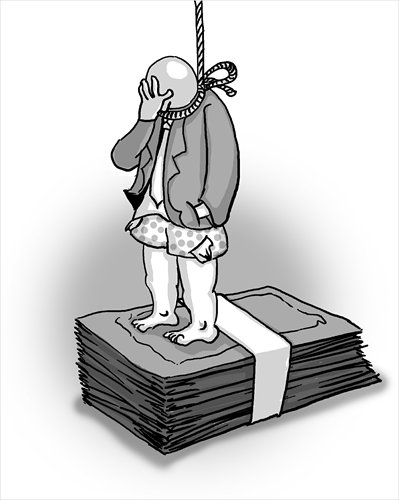Personal bankruptcy system next step for market

Illustration: Lu Ting/GT
Over the past several years, about a dozen heavily indebted steel traders - mostly from Fujian Province - have committed suicide in order to escape aggressive debt collectors and mounting financial losses. According to local media reports, some of the individuals who took their own lives had personal liabilities running at upwards of 50 million yuan ($8.21 million).
Steel traders, of course, should be held to same standards of accountability that apply to business professionals in other lines of work. Still though, it's tragic to see so many unfortunate and untimely deaths within a single industry; one long synonymous with overcapacity and low profitability.
As China gradually opens its economy to the forces of supply and demand, there are now more opportunities for losses and gains than ever before. These days, fortunes can hinge on an individual's ability to foresee trends in the market. But should a person ever have to pay for their business failures with their own life? The answer, obviously, is no.
To prevent further tragedies, China should introduce a personal bankruptcy protection system along the lines of those already found in many developed nations. When a financially unsound company is driven into bankruptcy, its assets can be liquidated or restructured in order to make the best use out of its resources. Entrepreneurs should have similar opportunities to discharge their debts and restart their lives.
China's legislature passed enterprise bankruptcy regulations back in 2006. Much more work still needs to be done though to establish a comprehensive bankruptcy system that can also apply to individuals. Calls for personal insolvency protection have existed for years, but policy action may soon be on the horizon given the emphasis on deeper market reforms seen in the blueprint that emerged from the recent Third Plenary Session of the 18th Communist Party of China Central Committee. Indeed, as the market plays an expanding role in business activity, more enterprises and entrepreneurs are bound to fail, a fact which only makes the need for safety nets more urgent.
All segments of China's business community stand to benefit from the implementation of personal bankruptcy protection. People on the losing end of failed ventures will certainly be grateful to obtain respite from their creditors as they go about rebuilding their lives financially.
In a related vein, insolvency safeguards can also discourage debt evasion. With nothing in the law to protect them, it's not uncommon to hear of destitute businesspeople fleeing overseas or moving to another part of China under an assumed identity.
Further progress on China's nascent credit rating system may also be possible under a more comprehensive set of bankruptcy policies. As many have pointed out over the years, the guesswork that goes into assessing creditworthiness in China has stalled the development of the private sector in particular and the economy in general. If bankruptcy protection records are made available to lenders and ratings agencies, this could improve credit efficiency and instill a stronger sense of responsibility among borrowers.
Banks, for their part, could also become better equipped to handle and release bad debts. According to recent statements made by Wu Xiaoling, vice chairperson of the Financial and Economic Affairs Committee of the National People's Congress, only by legally removing the debts of failed companies and individuals can banks clear their books of problematic loans. Although banks now have special reserves socked away to cover potential defaults, nonperforming loans are best dealt with through transparent, formalized procedures.
Some are concerned that the launch of a personal bankruptcy protection system will only spur reckless ventures or immoderate spending. Such anxieties show little more than a misunderstanding of what an effective system can, and should, achieve for Chinese society as a whole. What advocates of individual insolvency protections want is not to let borrowers totally off the hook. Those who run into repayment trouble, for whatever reason, should still have to face the consequences of their actions. Moreover, the ramifications of declaring bankruptcy should still be severe enough so that distressed borrowers only choose this option as a last resort.
The author is a senior analyst with Beijing-based private strategic think tank Anbound. bizopinion@globaltimes.com.cn